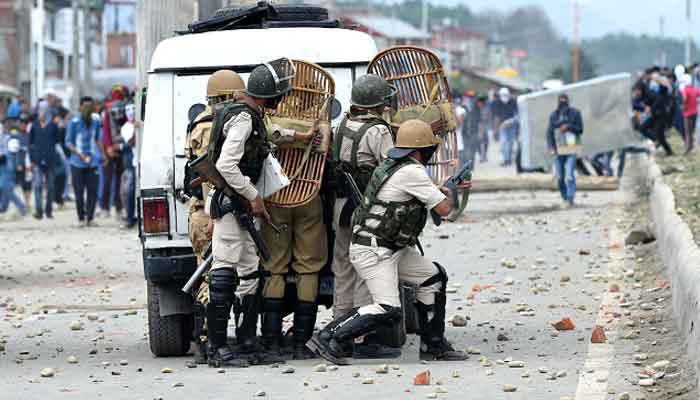Mass detentions, pellet injuries as clampdown continues in held Kashmir
More than 2,000 people have been detained in occupied Kashmir in the days leading to, and after, the August 5 revocation of Article 370 of the Indian constitution, which ended the special status of the occupied valley. Those detained include political leaders, elected representatives, lawyers, activists, businessmen and students.
HELD SRINAGAR: As the curfew and communications blackout enters the 25th day in the Indian-occupied Kashmir, thousands of Kashmiri citizens continue to be detained by Indian forces and several have been injured by pellet guns and tear gas.
According to a CNN report, more than 2,000 people have been detained in occupied Kashmir in the days leading to, and after, the August 5 revocation of Article 370 of the Indian constitution, which ended the special status of the occupied valley. Those detained include political leaders, elected representatives, lawyers, activists, businessmen and students. The residents told CNN that tear gas and pellet guns are being used against them and restrictions on movement are still in place.
"The government wants us to believe everything is normal. But we still find out about protests, tear gas, injuries despite the continued communication blockade," said shopkeeper Mushtaq Ahmad, 35, a resident of uptown Srinagar. "Everything is still shut in the city and around us, and the movement is almost impossible when the restrictions are in place."
Another resident, Farooq Ahmad Qureshi, recounted how he was hit by a pellet in the eye on his way to a bakery on August 10. "The doctors who treated me said I have little chance of regaining (my) sight as three pellets have seriously damaged my eye," he was quoted as saying. A doctor in the main hospital of Srinagar said he has treated dozens of patients who have sustained eye injuries caused by pellet guns. "We have so far treated 30 victims in the ophthalmology unit of SMSH (Shri Maharaja Hari Singh) hospital from August 5," the doctor told CNN on condition of anonymity.
Internet and mobile phone services meanwhile remain suspended in occupied Kashmir. "I have been going from pillar to post for the past 15 days to get in touch with my parents. But with no luck," said Najam Rous, 26, whose parents had travelled to Saudi Arabia for Hajj. When she finally managed to contact her family from her neighbour's landline phone, her "parents were crying and the first thing they asked me was if we had food at home."
On August 5, Modi´s Hindu-nationalist government revoked the autonomy of the Muslim-majority territory where tens of thousands of people have been martyred in an uprising against Indian occupation since 1989. New Delhi sent reinforcements to the estimated half a million troops already stationed in occupied Kashmir, cut phone lines and the internet, placed severe restrictions on movement and arrested thousands, according to multiple sources.
India says no civilian has died from police action since August 5. But residents have said at least three people have been martyred, including a young mother who choked after police fired tear-gas canisters into her home. Multiple hospital sources have told AFP at least 100 people had been hurt during the lockdown, some with firearm injuries.
-
 Eric Dane's Girlfriend Janell Shirtcliff Pays Him Emotional Tribute After ALS Death
Eric Dane's Girlfriend Janell Shirtcliff Pays Him Emotional Tribute After ALS Death -
 King Charles Faces ‘stuff Of The Nightmares’ Over Jarring Issue
King Charles Faces ‘stuff Of The Nightmares’ Over Jarring Issue -
 Sarah Ferguson Has ‘no Remorse’ Over Jeffrey Epstein Friendship
Sarah Ferguson Has ‘no Remorse’ Over Jeffrey Epstein Friendship -
 A$AP Rocky Throws Rihanna Surprise Birthday Dinner On Turning 38
A$AP Rocky Throws Rihanna Surprise Birthday Dinner On Turning 38 -
 Andrew Jokes In Hold As BAFTA Welcomes Prince William
Andrew Jokes In Hold As BAFTA Welcomes Prince William -
 Sam Levinson Donates $27K To Eric Dane Family Fund After Actor’s Death
Sam Levinson Donates $27K To Eric Dane Family Fund After Actor’s Death -
 Savannah Guthrie Mother Case: Police Block Activist Mom Group Efforts To Search For Missing Nancy Over Permission Row
Savannah Guthrie Mother Case: Police Block Activist Mom Group Efforts To Search For Missing Nancy Over Permission Row -
 Dove Cameron Calls '56 Days' Casting 'Hollywood Fever Dream'
Dove Cameron Calls '56 Days' Casting 'Hollywood Fever Dream' -
 Prince William, Kate Middleton ‘carrying Weight’ Of Reputation In Epstein Scandal
Prince William, Kate Middleton ‘carrying Weight’ Of Reputation In Epstein Scandal -
 Timothée Chalamet Compares 'Dune: Part Three' With Iconic Films 'Interstellar', 'The Dark Knight' & 'Apocalypse Now'
Timothée Chalamet Compares 'Dune: Part Three' With Iconic Films 'Interstellar', 'The Dark Knight' & 'Apocalypse Now' -
 Little Mix Star Leigh-Anne Pinnock Talks About Protecting Her Children From Social Media
Little Mix Star Leigh-Anne Pinnock Talks About Protecting Her Children From Social Media -
 Ghislaine Maxwell Is ‘fall Guy’ For Jeffrey Epstein, Claims Brother
Ghislaine Maxwell Is ‘fall Guy’ For Jeffrey Epstein, Claims Brother -
 Timothee Chalamet Rejects Fame Linked To Kardashian Reality TV World While Dating Kylie Jenner
Timothee Chalamet Rejects Fame Linked To Kardashian Reality TV World While Dating Kylie Jenner -
 Sarah Chalke Recalls Backlash To 'Roseanne' Casting
Sarah Chalke Recalls Backlash To 'Roseanne' Casting -
 Pamela Anderson, David Hasselhoff's Return To Reimagined Version Of 'Baywatch' Confirmed By Star
Pamela Anderson, David Hasselhoff's Return To Reimagined Version Of 'Baywatch' Confirmed By Star -
 Willie Colón, Salsa Legend, Dies At 75
Willie Colón, Salsa Legend, Dies At 75




